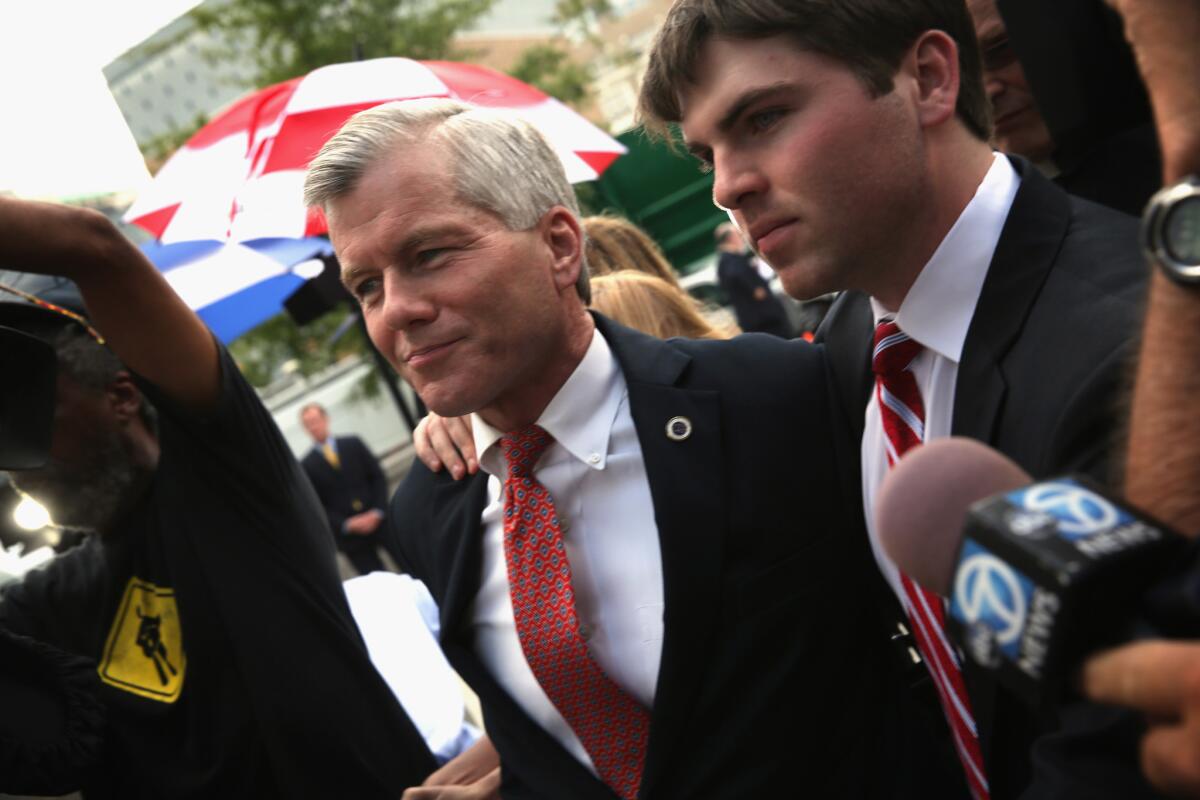Supreme Court to decide corruption case of former Virginia Gov. Bob McDonnell

Former Virginia Gov. Bob McDonnell, shown with son Bobby in 2014, was convicted that year of 11 counts of corruption and sentenced to two years in prison. The Supreme Court has agreed to hear his appeal.
- Share via
Reporting from Washington — The Supreme Court said Friday it would hear the political corruption case of former Virginia Gov. Bob McDonnell and decide if it was a crime for the state’s chief executive to secretly take $170,000 in cash and gifts from a wealthy businessman to help promote an untested dietary supplement made from tobacco.
Once a Republican star who was mentioned as a possible vice-presidential running mate for Mitt Romney, McDonnell was convicted of 11 counts of corruption in 2014 and sentenced to two years in prison.
But his lawyers say he was wrongly convicted because he did nothing more than make phone calls and set up a few meetings to help his benefactor. They also blamed his plight on “sensationalist media coverage” and overly aggressive federal prosecutors.
The federal bribery law makes it a crime for an official to take money or gifts in exchange for “official acts,” and McDonnell’s lawyers say the ex-governor’s efforts fall short of official acts because he did not order state health officials to test or approve the dietary supplement.
“This is the first time in our history a public official has been convicted of corruption despite never agreeing to put a thumb on the scales of any government decision,” they said in their appeal. “Officials routinely arrange meetings for donors, take their calls and politely listen to their ideas.”
In the past, the justices have been skeptical of criminal laws that did not clearly spell out the line between legal conduct and a crime.
In defense of the prosecution, U.S. Solicitor Gen. Donald Verrilli said the jury was presented with overwhelming evidence of a pattern of corruption.
Businessman Jonnie R. Williams said he was seeking state backing for his dietary supplement, and he bought the governor a $6,000 Rolex watch, took his wife on a $20,000 shopping spree in New York, gave him use of his Ferrari and his vacation home and twice gave him $50,000 loans to cover debts. Within days, or sometimes within a few minutes, McDonnell responded by calling state officials or sending emails to enlist support for the supplement Williams was promoting.
“The hallmark of corruption,” Verrilli said, is “dollars for political favors,” and prosecutors proved the ex-governor took money in exchange for favors, he said in urging the court to deny the appeal.
But Chief Justice John G. Roberts issued an order for the court in August that kept McDonnell out of prison while he appealed the conviction. That was seen as a sign that the justices, or at least some of them, had questions about the former governor’s conviction.
UC Irvine law professor Richard Hasen welcomed the court’s move, citing the danger of the “criminalization” of politics.
“The question presented in this case differs from some of the other recent high-profile corruption prosecutions, from Gov. [Rod] Blagojevich from Illinois, to Gov. [Don] Siegelman from Alabama to Gov. Rick Perry from Texas to John Edwards and Tom DeLay. But there’s a strong necessity for clear rules to deal with the danger of overzealous prosecutions and the criminalization of politics,” he said in a blog post Friday.
Separately, the court said Friday it would also hear a case involving allegations of police misconduct and decide whether a person who was wrongly arrested can sue for “malicious prosecution.”
Elijah Manuel, who is black, says he was stopped and pulled over in his car by white police officers in Joliet, Ill. He said they used racial slurs and arrested him because they wrongly concluded that a bottle of vitamin pills was illegal “ecstasy.” He accused the officers of lying.
He was booked in the county jail and held for weeks after officers testified the pills were illegal. A judge released him seven weeks later because lab tests had shown the pills were vitamins. But when Manuel sued Joliet and its officers for a “malicious prosecution” that violated his rights against “unreasonable searches and seizures,” a federal judge and the U.S. 7th Circuit Court of Appeals in Chicago said he had no claim, even if all he alleged was true. The high court voted to hear his appeal in the case of Manuel vs. City of Joliet.
The court will also hear a case of alleged religious discrimination. Missouri, like many states, has a constitution that says no taxpayer money may go to aid a church. When a church-run daycare center asked for scrap tire material that the state offers for school playgrounds, the request was turned down because it came from a church.
------------
FOR THE RECORD
2:45 p.m.: An earlier version of this post said the Missouri constitution says taxpayer money may go to aid a church.
------------
“No state can define religious neutrality as treating religious organizations worse than everyone else,” said David Cortman, a lawyer for the Alliance Defending Freedom, who appealed the case of Trinity Lutheran Church vs. Pauley.
Thirdly, the court will decide whether the “service advisors” at Encino Motorcars qualify for overtime under federal law. The Labor Department decided these employees are not “salesmen” and therefore, are entitled to overtime pay. Lawyers for the car dealership appealed, and won a review in Encino Motorcars vs. Navarro.
All of these cases are likely to be argued in April and decided by the end of June.
On Twitter: @DavidGSavage
More to Read
Sign up for Essential California
The most important California stories and recommendations in your inbox every morning.
You may occasionally receive promotional content from the Los Angeles Times.











